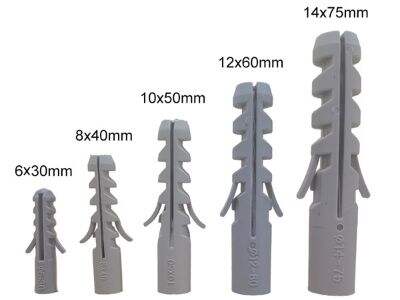Plastic or Metal Washers: is it ever a question? The choice can be tricky because each type of washer has its pros and cons. In this article, we will examine the difference between anchor plastic and metal washers so that you can select the right one for your specific needs and know how each kind operates.
Plastic vs. Metal Washers
First off are the plastic washers. These washers can be made from various types of plastic, including nylon or polypropylene. Plastic washers are as light weight as cash can get. This makes them easy and transport. They also do not rust, which allows them to be used in places where moisture is present without fear of damaging them. In addition, plastic washers are usually less expensive than metal washers, so they are a good choice if you are trying to save some money. Plastic washers have another advantage: they can absorb vibrations and shocks. This keeps machines in good shape, minimizing noise and wear.
Plastic washers do have some drawbacks, however. A characteristic of Clavos de arandela de plástico measures their strength, and therefore plastic washers are not as strong as their metal counterparts. Or, if you need the washer for something that will be highly stressed, plastic may not be a good option. And plastic washers may not last as long as metal ones. They can melt or deform if heated too much, or certain kinds of plastic can crack or shatter if put under excess stress or pressure.
Now, coming to metal washers. These kinds of expansion anchor plastic are made of durable materials, such as steel, brass, and aluminum. Metal washers are highly durable and strong. They have high-pressure and high-temperature capabilities and thus suitable for heavy-duty jobs. Metal washers are also excellent in that they last long. That means they can be used time and again, well before they need to be replaced.
Metal washers are usually heavier than Arandelas de plástico para tableros de espuma, so they may be a bit more cumbersome to use in some instances. They are also usually pricier than plastic washers. Metal washers also have a higher tendency to rust if they are not properly protected against moisture. Metal can conduct electricity, and this can lead to safety issues in specific situations. Lastly, even though metal washers are extremely sturdy, their shock and vibrational absorption are not as great as that of the plastic washers.
Answering the Right Washer for Your Needs
Once you have a choice over which type of washer to use, it all begins by considering what you need it for. Take time again and think about some of the following crucial questions:
How much pressure my washer will have to deal?
What temperatures will it be subjected to during use?
Does my washer need to be rust free and exposed to abusive chemicals?
Is there an application-related risk of electrical or electrical-related failure?
How long should my washer last until it is upgraded?
Once you have the answers to these questions you'll be better able to determine whether drywall plastic or metal washers are suited for your situation. As an example, if you were aware that you require a washer capable of withstanding rather high temperatures, a metal washer would probably be the ideal solution. Alternatively, a plastic washer is an appropriate choice for something low weight and rust-proof.
How the Right Material Aids Performance?
When it comes to your equipment’s performance, selecting the proper washer is crucial. Using a washer that is too weak for the job, for example, can cause leaks or even lead to your machinery breaking down. On the other hand, washing too heavy can cause excess load on your machines, which can cause troubleshooting issues in the long run. Poor quality material may lead to rust or failure, which is costly in dollars and time. You can eliminate this by having the proper washer that will only help you save more time in your project. So, let's try to understand some of the types of washers.
Plastic and Metal Washers Contribution and Environmental Impact
Another thing that must be considered by selecting the proper washer is its environmental impact. Plastic as well as metals cannot be assumed as harmless elements. In fact, plastic seems more environmental friendly in comparison due to its weight being lighter along with less energetic energy consumption required during its processing. It's easy to recycle, too, unlike metal. Plastic, of course, does the opposite kind of damage; when not managed correctly, they become destructive entities to the world. For example, it can take plastic hundreds of years to decompose in landfills, and certain types of plastics can release harmful chemicals into the ground and water tables.
However, metal is harder to recycle and can be more damaging to the environment while being made, but it is also much more durable and has a longer life than plastic. This durability can mean reduced replacements — less waste. Certain metals, such as stainless steel, have more resistance to rust than plastic, which begs them to last longer and in good order for longer periods of time.
Choosing the Right Option for You
In conclusion, when deciding between drywall plastic screw, consider your unique needs, the performance of your equipment, and the effects on the environment. Plastic and metal washers each have pros and cons. You should choose the arandelas aislantes that best fits your needs. Additionally, to ensure you are buying the right washer for your industry and budget, it may be necessary to turn to the experts. Having the right information helps you make an informed choice that makes sense for your projects.
 EN
EN
 AR
AR
 BG
BG
 HR
HR
 CS
CS
 DA
DA
 NL
NL
 FI
FI
 FR
FR
 DE
DE
 EL
EL
 HI
HI
 IT
IT
 JA
JA
 KO
KO
 NO
NO
 PL
PL
 PT
PT
 RO
RO
 RU
RU
 ES
ES
 SV
SV
 TL
TL
 IW
IW
 ID
ID
 SR
SR
 UK
UK
 VI
VI
 HU
HU
 TH
TH
 TR
TR
 FA
FA
 MS
MS
 GA
GA
 IS
IS
 LA
LA
 MN
MN
 NE
NE
 KK
KK
 UZ
UZ



